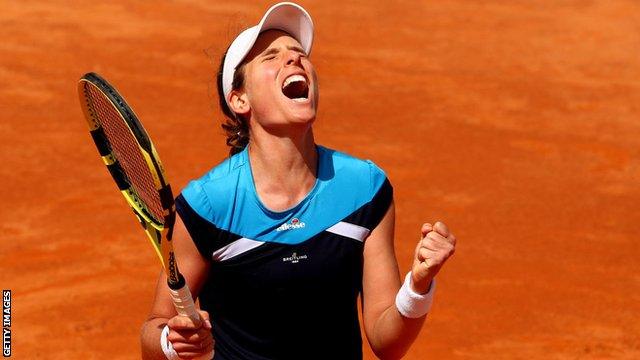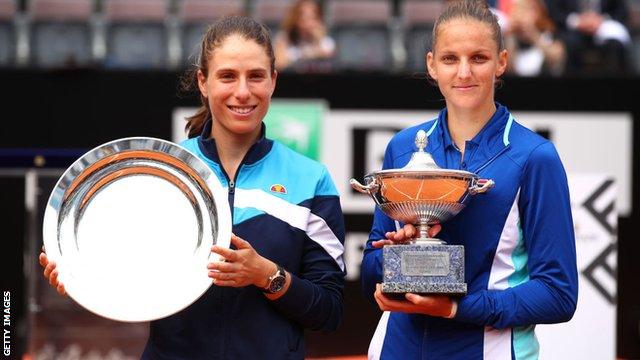French Open: Johanna Konta doing all the right things as she heads to Roland Garros
- Published

Johanna Konta will be seeded 26th at Rolland Garros after an impressive start to the year
2019 French Open |
|---|
Venue: Roland Garros, Paris Dates: 26 May-9 June |
Coverage: Live text and radio commentary on selected matches on the BBC Sport website and app. |
When a small gaggle of reporters met Johanna Konta at the door of the locker room to talk about her exit from the Australian Open in January, the focus was on the hour rather than her performance.
Konta's second-round match with Garbine Muguruza had ended at 3.12am.
Former Wimbledon champion Muguruza hit a couple of memorable returns in the final game to clinch the deciding set 7-5. But, even in defeat, the British number one had offered an early sign that 2019 could develop into a much happier year.
The omens are even more encouraging heading into the French Open. True, Konta has never won a singles match at Roland Garros, but she has had an outstanding clay court season and recorded six wins out of six in a British Fed Cup vest.
One of those came in Bath in February against Serbia's Aleksandra Krunic, despite Konta feeling "light-headed, shaky and a little bit out of body".
Another came in the World Group play-off tie against Kazakhstan in April, as Konta won 16 of the last 18 points and recovered a double-break deficit in the deciding set to beat Yulia Putintseva.
Since then, on the clay, Konta has reached finals in Rabat and Rome, with a Madrid defeat by the French Open champion Simona Halep sandwiched in-between. Grand Slam champions Sloane Stephens and Venus Williams, plus world number four Kiki Bertens, have all been dispatched.
As a result, the 28-year-old stands at 26 in the world. Seeded at Roland Garros - and almost certainly at Wimbledon, too - Konta will start on Monday against the German qualifier Antonia Lottner.

Johanna Konta reached the final of the Italian Open earlier this month
So what has changed?
Konta is once again doing consistently what she did so well in that remarkable two-year spell which culminated in a Wimbledon semi-final and a world ranking of four.
That potent first serve is going in. Of the players ranked above her, only Halep, Stephens and Caroline Garcia have landed more first serves this season. The second serve has also stood up to scrutiny, and only one player in the top 100 (Jennifer Brady of the United States) has saved more break points than Konta.
She has won 10 of her 12 three-set matches, and the drop shot - which used to cause palpitations in the commentary box whenever attempted - has become an asset.
Konta's dedication to the job is widely respected, and had impressed Dimitri Zavialoff long before he became her coach after a successful trial at last October's Kremlin Cup.
After an underwhelming year with American Michael Joyce, Konta progressed to the last four in Moscow. In the seven months since, Zavialoff - who grew up in France but has spent most of his adult life in Switzerland assisting Stan Wawrinka and Timea Bacsinszky - has successfully brought his understated presence to the team.
"I put the player in the front," the 43-year-old told BBC Sport in the player restaurant at Roland Garros.
"I'm trying not to impose anything, just lots of talks to try and see what the player wants. I try and guide a little bit the player.
"Johanna is able to do anything on the court. Slowly I speak with her about when to do it, and when not to do it. First in the practice, then in practice matches, then in competition - and then on the Centre Court at Wimbledon."
Ten years ago, the WTA introduced on-court coaching. Zavialoff is not a fan. He says he did not come onto court once in his five years with Bacsinszky, and is sticking to the same formula with Konta.
"For me, it's about trying to build confidence," he says.
"I'm trying to show the player I'm confident with what choices the player is going to do. I don't want to control anything, and I prefer to give the full autonomy to the player within a match. A human being is so complex, you don't know what mental state a player has during a match, and it is so difficult to say something in there.
"It takes time for a player to realise no-one is going to help in the moment, and they need to find their own solutions."
Konta admits it has taken some getting used to, but now sees it as a welcome and positive adjustment.
Her surge in form on clay, she says, is a "nice coincidence". It is not down to any surface-specific work, she says, but rather weeks and months of hard work - and the springboard of the Fed Cup.
"For me personally, but also for us as a team, we came through some pretty tough situations," she says.
"I came back in a lot of the matches and that can only really build my trust within my own ability."
Konta's record at the French Open | |
|---|---|
Year | Result |
2015 | First round - lost 7-6 (19-17) 4-6 6-2 to Denisa Allertova |
2016 | First round - lost 6-2 6-3 to Julia Goerges |
2017 | First round - lost 1-6 7-6 (7-2) 6-4 to Hsieh Su-wei |
2018 | First round - lost 6-4 6-3 to Yulia Putintseva |
Former player Dan Smethurst also assists the coaching, and another important member of the team is sports psychologist Lorenzo Beltrame. The Italian, who now lives in Florida, has worked with Pete Sampras, Jim Courier and numerous Olympians.
It may be that he is now filling the void left by Juan Coto, who played such a significant role in Konta's emergence until his untimely death in late 2016.
"He's been with me now for just over a year," Konta says.
"It was nice to have him in Rome - he also works a bit for the Italian Federation, so that worked out nicely there. Before that, he was with me in Miami for a few days.
"He doesn't come too often to tournaments, but I'm basically in contact with him every day remotely."